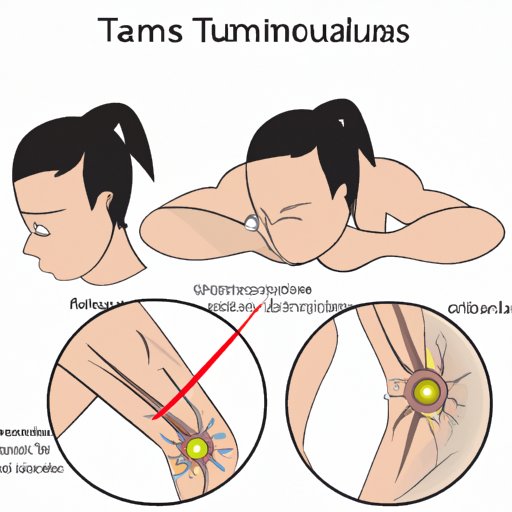
Introduction
Tetanus is a serious bacterial infection that affects the muscles and nervous system. It’s important to know the symptoms of tetanus to seek prompt medical attention and prevent complications.
Understanding Tetanus
Tetanus, also known as lockjaw, is caused by a toxin produced by the bacterium Clostridium tetani. The bacteria can enter the body through wounds or cuts and produce the toxin. Tetanus is not contagious and cannot be spread from person to person.
The importance of prevention and vaccination cannot be overstated. Tetanus can be prevented by ensuring that wounds are cleaned and treated properly and by receiving vaccination against tetanus. Most individuals receive the vaccine as part of their childhood vaccination schedule, but booster doses are recommended every ten years.
Identifying Symptoms of Tetanus
The onset of symptoms can occur anywhere from a few days to several weeks after the bacteria have entered the body. The symptoms of tetanus can vary in severity and may include:
- Jaw stiffness or spasms
- Muscle stiffness and pain
- Fever and sweating
- Rapid heart rate
- Difficulty swallowing or breathing
- Uncontrolled muscle spasms or convulsions
If you experience any of these symptoms, it’s important to seek medical help immediately.
Case studies or specific examples can help illustrate the severity of tetanus symptoms and the importance of prompt treatment. For example, in one case study, a man presented with lockjaw, muscle spasms, and fever after sustaining a foot injury while working in the soil without gloves. He required several weeks of hospitalization and treatment with medication and a breathing machine to recover.
Early Warning Signs
There are several early warning signs of tetanus that can help identify the infection before it becomes severe. The following are signs to look out for:
- Stiffness or spasms in the jaw muscles
- Muscle stiffness or pain in the neck, arms, or legs
- Fever or headache
- Sweating or rapid heartbeat
- Difficulty swallowing or opening the mouth
If you experience any of these early symptoms, it’s important to seek medical attention right away. Early diagnosis and treatment can prevent the infection from progressing and causing more severe symptoms.
Different Types of Tetanus Symptoms
There are several different types of tetanus symptoms that can occur:
- Localized tetanus: symptoms are confined to the area around the wound.
- Cephalic tetanus: symptoms occur in the muscles of the face and head.
- Generalized tetanus: symptoms affect the entire body.
- Neonatal tetanus: occurs in newborns who have not been vaccinated.
Each type of tetanus symptom can affect the body in different ways, and understanding these differences can help with diagnosis and treatment.
How to Tell if You Have Tetanus
If you suspect that you have tetanus, it’s important to seek medical attention right away. The following are some simple, straightforward symptoms to look out for:
- Jaw stiffness or spasms
- Muscle stiffness or pain
- Fever and sweating
- Rapid heartbeat
- Difficulty breathing or swallowing
It’s important to remember that the earlier tetanus is diagnosed and treated, the better the outcome is likely to be.
Conclusion
Tetanus is a serious infection that can cause muscle stiffness, spasms, and other symptoms. It’s important to be aware of the symptoms and seek medical attention right away if you suspect you have been infected. Prevention and vaccination are key to avoiding tetanus and ensuring good health.





